Increasingly the New Zealand Parliament is becoming a place for the affluent. New research out today on the socioeconomic and occupational backgrounds of those in the current Parliament shows that MPs are becoming more and more homogenous. Despite diversifying demographics in terms of gender, ethnicity, sexuality and so forth, our central democratic institution is narrowing in terms of social class – becoming a Parliament of the Rich.
This morning the MP Career Report of New Zealand’s 54th Parliament has been released, put together by researchers at the Blackland PR firm. It’s a triennial study in which the researchers look at the backgrounds, and particularly the occupations, of each Parliament. The latest one shows some interesting trends.
Overall, the report paints a picture of MPs generally starting life in relatively wealthy families, going to higher socio-economic schools, almost always going to university, and often getting postgraduate qualifications. They then go into professional jobs, often associated with working for the government. This affluent pathway to power is expressed in the report’s graphic below
Affluent Beginnings for MPs
MPs generally only make it to Parliament if they start life in relative wealth. The researchers looked at MPs’ family upbringings, schooling, and so forth, and concluded: “at least two thirds of MPs come from families with above average incomes. Their parents are usually well-educated white-collar workers or in specific professions. It is notable that one third of the MPs for whom we could source primary and secondary school data attended private or integrated schools.”
Auckland Grammar supplies more MPs than any other school in the country. The researchers were able to locate the schooling details on 70 of the current 123 MPs, and of these, 7 had been students at Auckland Grammar. Many others went to private or integrated schools – 35% of MPs, compared to a national figure of only 18%.
In contrast, very few MPs had gone to poor schools – only “10 MPs attended schools with decile rating 3 or under.” The average decile rating of MPs’ high schools was 7.
Those on the pathway to Parliament then go to university. According to the research, 78% of the Parliament have university degrees – they say that this is compared to only 11% of the population. In terms of postgraduate qualifications (MAs, PhDs, etc), a third of the current MPs have them (41 MPs). The authors note that the New Zealand Parliament’s proportion of postgraduate qualifications is triple that of that of the US and UK.
It's at university that MPs generally become “politicised” say the researchers, who studied their biographies. They generally study in the humanities, arts and law – the research found that 48% have degrees in those areas. They then generally become active in a political party, work in about three office jobs, and then in their early to mid-40s get into Parliament, normally after 2-3 attempts.
The chart below illustrates some of the education differences between the New Zealand Parliament and wider society.
The Affluent professions that produce NZ’s MPs
The research found that the following six professions are where most of the current MPs have worked prior to being elected to Parliament (in descending order): elected representatives, managers, business owners, analysts, lawyers, and farmers.
All these professions are now over-represented in Parliament, compared to wider New Zealand population. The chart below shows the over- and under- representation of professions in Parliament. For example, although about 0.5% of the public have legal work experience, about 13% of MPs do.
In terms of law, the research found that there are 17 current MPs who were lawyers, of which most are in Labour (9 MPs) and National (6 MPs). And a total of 24 MPs have law degrees.
There is also a fast-increasing number of MPs with backgrounds in media and communications. As seen in the table below, since 2011 the number of politicians with backgrounds in media and PR has tripled.
The number of MPs that have taken a path to Parliament via local government is also at an all-time high. Examples of MPs that were previously local councillors and mayors are pointed out in the report: “the Green’s Lam Pham (ECAN for 2 terms), Tamatha Paul (WCC Councillor) and Celia Wade-Brown (WCC Mayor). Cameron Brewer (Nat) served on the Auckland Council; Ryan Hamilton (Nat) was a Hamilton City Councillor; and Andy Foster (NZF) was a Wellington City Councillor and Mayor of Wellington.”
In general, careers that involve being paid by the taxpayer seem to be increasing for those on the way to becoming MPs. The Blackland researchers found that 35% of current MPs had their main pre-Parliament job funded by government.
Business ownership is another key characteristic of current MPs. Either in the past or currently, a total of 42 MPs were found to be business owners. Here’s the breakdown of this by party: “17 National, 11 Labour, 8 ACT, 3 NZ First, 2 Greens, 1 Te Pati Māori.”
Increasing homogeneity of MP backgrounds
Traditionally, different political parties have delivered very different MPs to Parliament, especially in terms of their socioeconomic and occupational backgrounds. However, the Blackland researchers found that in 2024 the “parties are not significantly differentiated by career” and “Much of the variety in work experience in the previous Parliament has disappeared.” For more on this, you can also read the commentary of Blackland PR analysts Mark Blackham and Emily Mingins in their column, A Parliament of office workers
They say “There is less variation between the working backgrounds of Parties than in the past. The majority of employment no matter what party the MP belongs to, is some form of manager, analyst, lawyer or representative. There is an intriguing commonality between National and Labour, whose MPs almost entirely dominate the categories previous work as an elected representative or lawyer.”
The chart below shows each party’s three biggest employment background
And while commerce and government jobs are increasing where the stepping stones to Parliament are, we can also detect where the pathways to power no longer exist. For example, teaching, which was once one of the key contributors to politics has been quickly falling away as a background of parliamentarians. The Blackland researchers say that while the last Parliament had 20 ex-teachers, the current one has only 6.
Why the backgrounds of MPs matter
Does it matter that the backgrounds of MPs are changing? And does it matter that they are becoming more homogenous, yet more different to wider society?
According to the researchers, the backgrounds of the MPs and their sameness is likely to have real consequences in terms of the types of laws and policies they create. The following section of the report is worth quoting at length:
“In short, the very similar types of people, from similar backgrounds, will bias the decisions and output from Parliament. They are similar sorts of people; from a similar socio-economic group, sharing school and university experiences, and preferring academic and cerebral interests. This increases the potential that they would not share or appreciate the concerns of many voters. Studies have shown that the qualifications of MPs affect what they choose to address legislatively. This would result in a bias to the issues and legislation being generated by Parliament. Even more worryingly, this similarity between the class of MPs suggests that, aside from ideology, their frame of reference and concern for the content of legislation will differ from many voters. We conclude that the dominant tertiary and humanities education path of MPs is likely to lead to very a particular focus for policy that excludes many parts of the nation’s business and society. Where and when they do deal with issues less familiar to them, it will lead to decision-making different to what would be made by voters.”
The Public’s disconnect with an affluent Parliament
The increasing gap between the backgrounds of MPs and that of their constituents could be driving greater dissatisfaction with New Zealand’s democracy. As our politics becomes more elitist, detachment seems to be increasing.
Each year Parliament commissions the Kantar research company to survey what New Zealanders think about their political system. The most recent survey available on the Parliament website shows some alarming results, suggesting that the public thinks very poorly of Parliament.
Here are some of the stats that stand out about how little the public feels any sort of affinity with the House of Representatives:
Only 13% “feel a sense of ownership of Parliament” (down from 21% in 2018)
Only 13% “feel connected to Parliament”
Meanwhile, there’s a sense that Parliament isn’t listening or responsive to the public:
28% believe “an individual can’t influence Parliament”
41% “feel there's no point in trying to influence Parliament as nothing will change”
58% “believe big business and vocal minorities are the ones who influence Parliament” (13% disagree)
You can read the report here: Survey of the New Zealand Public
Creation of a “political class”
New Zealanders don’t feel particularly warm or respectful towards our central democratic institution. There’s an obvious disconnect. This is despite the fact that Parliament has been modernising, especially in regard to the representation of historically under-represented demographics in terms of sex, ethnicity, age, and sexual orientation.
Perhaps the negative orientation towards Parliament is because there’s a sense that regardless of the changing ethnicity, age and gender composition, it’s still a rather homogenous place in terms of socioeconomics and class. Increasingly the New Zealand Parliament is becoming a place for the affluent. I wrote about this after last year’s election: New Zealand needs a more working-class Parliament
We can therefore understand contemporary politics in 2024 as being captured by a “professional managerial class”, or PMC – those that work in the powerful new middle class professions that are big in central Wellington, Auckland, and so forth. These people work in government departments, private business, and dominate the influence on decision-making.
This increasing homogeneity of power is especially interesting at a time of increasing ideological polarisation in society and politics. Debates are heating up, getting more ferocious, and becoming more about personal identity – especially in terms of gender, sexuality and ethnicity. But the Blackland researchers say that this rising polarisation and identity politics might better be understood by the reality that Parliament is actually a cosy club of politicians: “Despite an apparent polarisation of views, and despite MPs looking different, they have more in common in their backgrounds with each other than with voters.”
That’s worth thinking about some more. Leaders like Chris Hipkins and Chloe Swarbrick have more in common with the likes of Winston Peters and David Seymour than they do with their voters. Conversely, the poor, struggling and homeless of the Hutt Valley and Auckland Central have more in common with each other than that of rich MPs, or even the various party activists at university who are on the pathway to Parliamentary jobs and elected office.
Former Act Party leader Rodney Hide once gave an insight into this, when he spoke about his comradeship with MPs from across the political spectrum, saying: “We bump into our opposition parties in the airport all the time and you end up actually chatting away. There’s a sort of public thing of being against each other politically and all the rest of it, but there’s also a camaraderie in the sense that you’re in the same business”.
It’s becoming clearer that this “business of politics” is one in which the politicians arrive from very similar pathways. It’s one of affluence from start to finish.
Dr Bryce Edwards
Political Analyst in Residence, Director of the Democracy Project, School of Government, Victoria University of Wellington
This article can be republished for free under a Creative Commons copyright-free license. Attributions should include a link to the Democracy Project (https://democracyproject.nz)

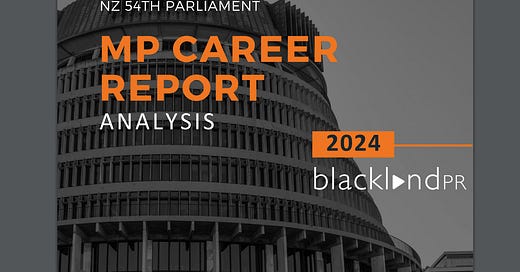




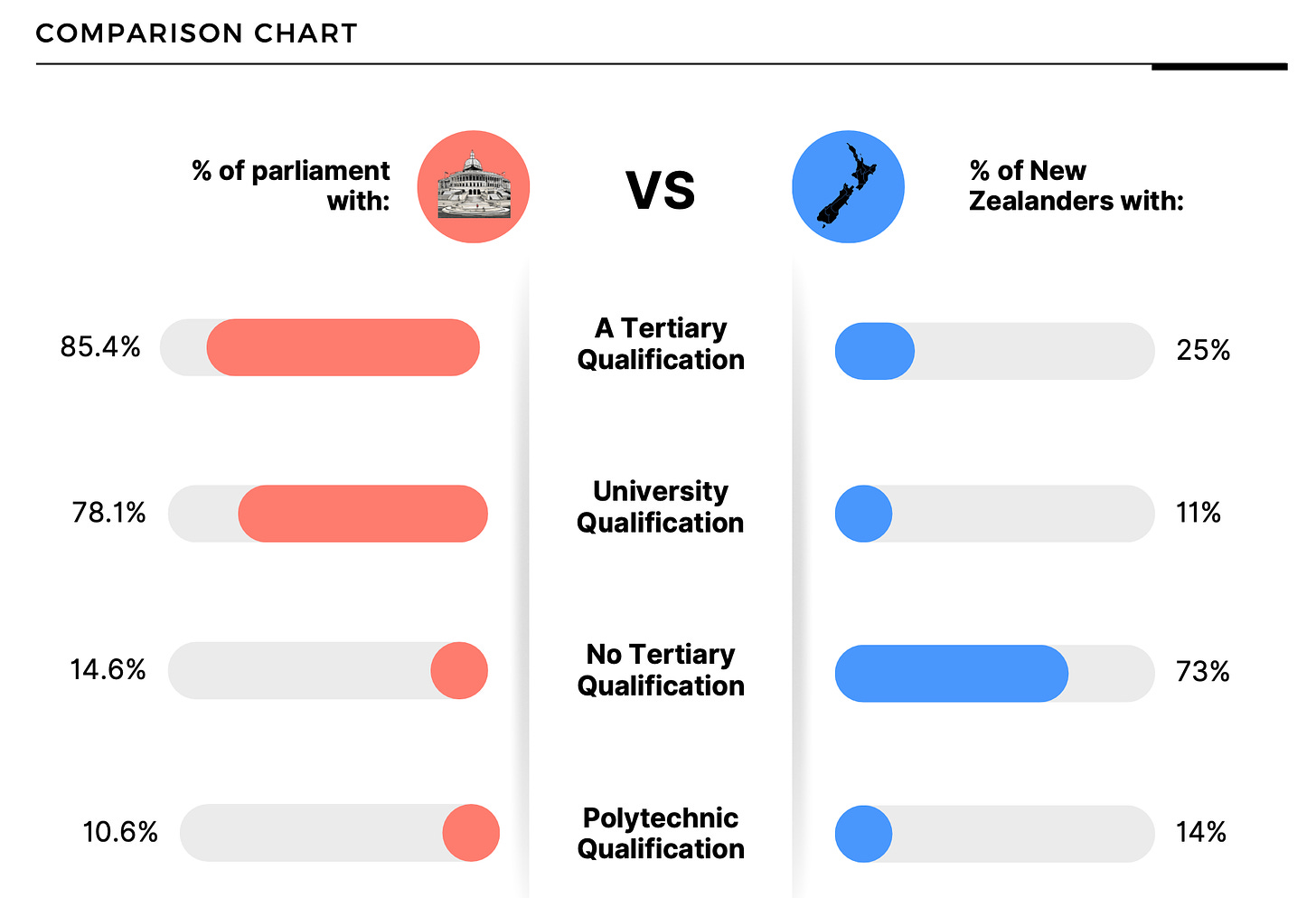
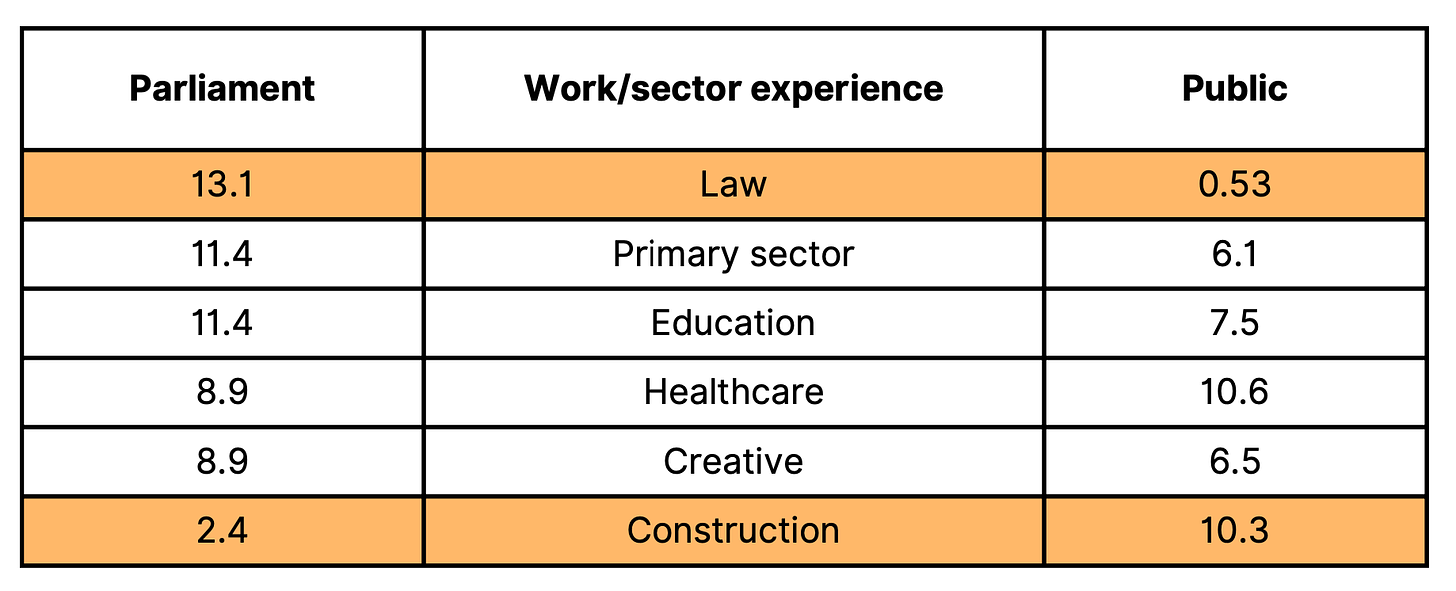
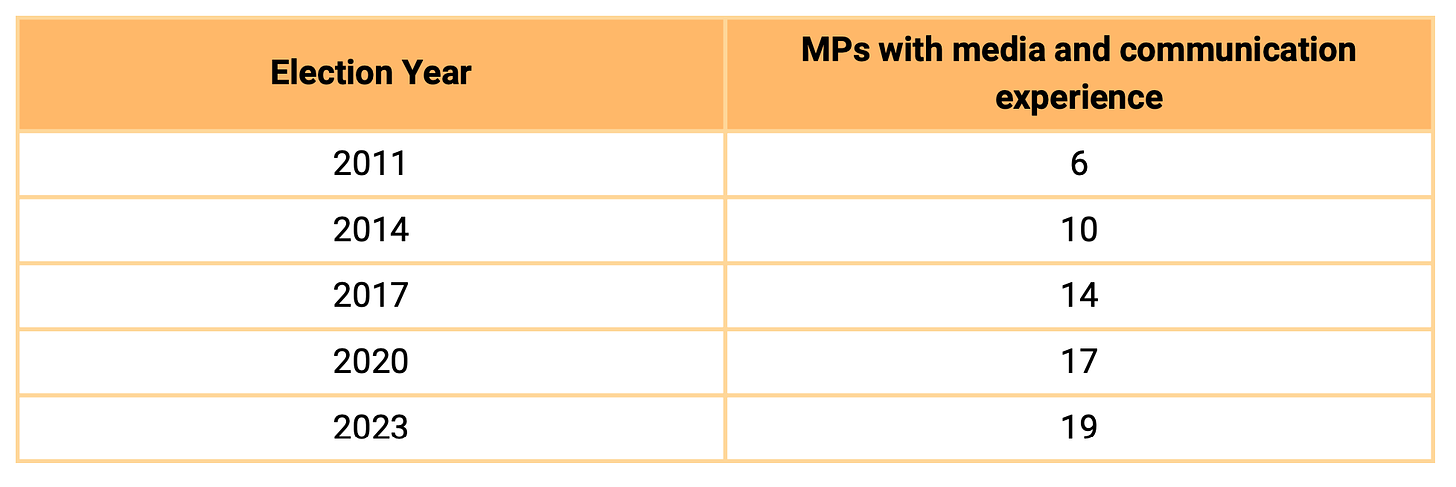
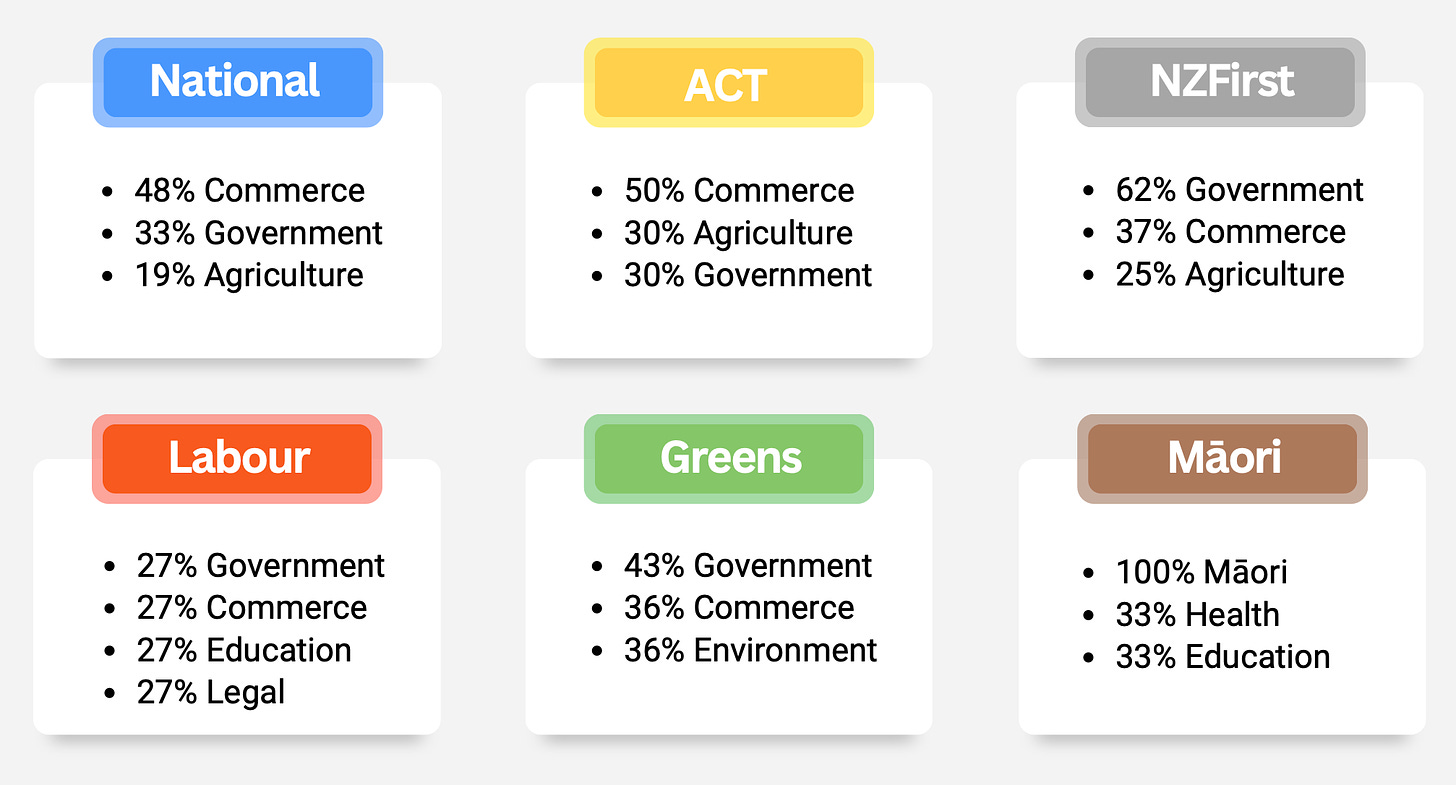
Does anyone have links to prior versions of this? (Aka back history of these reports)
It would be interesting to see the trends on this… this para suggests / frames a long sequence of reporting on this - so I’d love to see those reports and/or data…
“This morning the MP Career Report of New Zealand’s 54th Parliament has been released, put together by researchers at the Blackland PR firm. It’s a triennial study in which the researchers look at the backgrounds, and particularly the occupations, of each Parliament.”
TIA
Fascinating